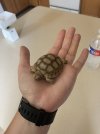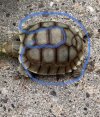Hi there all
I was hoping I would never have to write a post like this, but I am not sure what else to do.
I got Joker, my little sulcata tortoise, back in May at a reptile expo. The woman who sold her to us had her on consignment from a friend and told us the tortoise was roughly 3 months old. I loved her immediately due to her light shell color and split scute. I thought it made her unique, and I love that quality in all things.
She was eating well and “running” around supervised outside. She would go probably 30/40ft all around the flower beds before getting tired. She was eating a diet of Mazuri pellet food, mixed greens, various weeds, some grasses that her little mouth could bite through, and some occasional vegetables as treats. She also really enjoyed eating a few bites of banana once in a while as a small treat. Her food was dusted with calcium powder w/out vitamin d once a week. She has a UVB bulb, but i do not use it much as I take her outside for 15-30 mins every other day.
About a week and a half ago, I picked her up and noticed the sides of her shell felt soft. Not pliable, but spongelike. She was still moving and eating good so I didn’t think much of it and decided to give her the calcium powder twice a week. About 4 days later, I noticed that it was very very soft. She started becoming more lethargic. She used to get a burst of energy for about 2 hours from 9-11am and again from 5-7pm. She also used to eat for about 30 mins before falling asleep.
She is being housed in a 4x2 tub which is covered half way to keep in humidity. The heated side has a basking temp of 90-95 degrees, and the covered side is 80 degrees and stays at least 80% humidity. At night the temps stay around 80. Her substrate is a mix of coconut coir and cypress mulch.
She was getting soaked every morning for 20 mins and would “stomp” and try to climb out of the bowl.
In the last week, she has to be physically woken up in order to open her eyes. She isn’t moving during her soaks as much, and isn’t eating very much. She takes about 7 steps before wanting to fall asleep. Her shell is soft on the sides and the top sides of her shell has a blue tint. Like the scutes are getting transparent maybe? And you can see some sort of blue color coming up through the scutes? Hard to explain. She also hasn’t seemed to gain any weight. When I got her, she was supposedly 3 months old and weighed roughly 1oz. (I don’t have a gram scale and used an old spring style kitchen scale). She is now 4ish months old and weighs almost 1.5oz. It’s hard to tell on the scale I have and I will be getting a new digital one in the next day or two. Either way, it seems that her weight is way too low for her age.
From what I have read, she seems to have every symptom of Hatchling Failure Syndrome. I have a feeling that the people I bought her from did not house her correctly…they advised feeding hay as a main staple… I didn’t learn until later that most baby tortoises won’t/can’t eat it until they are older. Thinking back on it now, it seems like hay was one of the only foods the ladies had in the enclosure they were being showed off in at the expo.
I have been giving her two soaks a day for the last 5 days (for 15-20mins at a time) in a mix of water, unflavored pedialyte, and carrot baby food. I’ve read elsewhere on the forum that this could help.
In the last 4 days, it doesn’t seem that her condition has improved or gotten worse…has seemed to stay stagnant. I am at a loss of what to do. I love this little tort so much and I hate to see her suffer. She is still eating, but it’s not very much. Maybe half of a wet Mazuri pellet and a bite of a weed. She poops only in her enclosure (never has in water during her soaks) and only poops like twice a week.
I would hate to put her down or something if she could pull through, but it is also so hard emotionally to keep taking care of her if she isn’t going to get any better. I don’t want this to be like a situation where I’m keeping her on “oxygen” like for humans. Where their body is being kept alive, but they will never have a good quality of life.
I just don’t know what to do. If anyone has any advice on what I could do please let me know. Sorry for the long post but I wanted to give as much info as possible. I’m including a picture of her to try to show her shell. The discoloration is hard to see on the phone, but I tried to circle it.The picture in my hand is from before I noticed her symptoms, but it shows her size.

I was hoping I would never have to write a post like this, but I am not sure what else to do.
I got Joker, my little sulcata tortoise, back in May at a reptile expo. The woman who sold her to us had her on consignment from a friend and told us the tortoise was roughly 3 months old. I loved her immediately due to her light shell color and split scute. I thought it made her unique, and I love that quality in all things.
She was eating well and “running” around supervised outside. She would go probably 30/40ft all around the flower beds before getting tired. She was eating a diet of Mazuri pellet food, mixed greens, various weeds, some grasses that her little mouth could bite through, and some occasional vegetables as treats. She also really enjoyed eating a few bites of banana once in a while as a small treat. Her food was dusted with calcium powder w/out vitamin d once a week. She has a UVB bulb, but i do not use it much as I take her outside for 15-30 mins every other day.
About a week and a half ago, I picked her up and noticed the sides of her shell felt soft. Not pliable, but spongelike. She was still moving and eating good so I didn’t think much of it and decided to give her the calcium powder twice a week. About 4 days later, I noticed that it was very very soft. She started becoming more lethargic. She used to get a burst of energy for about 2 hours from 9-11am and again from 5-7pm. She also used to eat for about 30 mins before falling asleep.
She is being housed in a 4x2 tub which is covered half way to keep in humidity. The heated side has a basking temp of 90-95 degrees, and the covered side is 80 degrees and stays at least 80% humidity. At night the temps stay around 80. Her substrate is a mix of coconut coir and cypress mulch.
She was getting soaked every morning for 20 mins and would “stomp” and try to climb out of the bowl.
In the last week, she has to be physically woken up in order to open her eyes. She isn’t moving during her soaks as much, and isn’t eating very much. She takes about 7 steps before wanting to fall asleep. Her shell is soft on the sides and the top sides of her shell has a blue tint. Like the scutes are getting transparent maybe? And you can see some sort of blue color coming up through the scutes? Hard to explain. She also hasn’t seemed to gain any weight. When I got her, she was supposedly 3 months old and weighed roughly 1oz. (I don’t have a gram scale and used an old spring style kitchen scale). She is now 4ish months old and weighs almost 1.5oz. It’s hard to tell on the scale I have and I will be getting a new digital one in the next day or two. Either way, it seems that her weight is way too low for her age.
From what I have read, she seems to have every symptom of Hatchling Failure Syndrome. I have a feeling that the people I bought her from did not house her correctly…they advised feeding hay as a main staple… I didn’t learn until later that most baby tortoises won’t/can’t eat it until they are older. Thinking back on it now, it seems like hay was one of the only foods the ladies had in the enclosure they were being showed off in at the expo.
I have been giving her two soaks a day for the last 5 days (for 15-20mins at a time) in a mix of water, unflavored pedialyte, and carrot baby food. I’ve read elsewhere on the forum that this could help.
In the last 4 days, it doesn’t seem that her condition has improved or gotten worse…has seemed to stay stagnant. I am at a loss of what to do. I love this little tort so much and I hate to see her suffer. She is still eating, but it’s not very much. Maybe half of a wet Mazuri pellet and a bite of a weed. She poops only in her enclosure (never has in water during her soaks) and only poops like twice a week.
I would hate to put her down or something if she could pull through, but it is also so hard emotionally to keep taking care of her if she isn’t going to get any better. I don’t want this to be like a situation where I’m keeping her on “oxygen” like for humans. Where their body is being kept alive, but they will never have a good quality of life.
I just don’t know what to do. If anyone has any advice on what I could do please let me know. Sorry for the long post but I wanted to give as much info as possible. I’m including a picture of her to try to show her shell. The discoloration is hard to see on the phone, but I tried to circle it.The picture in my hand is from before I noticed her symptoms, but it shows her size.

